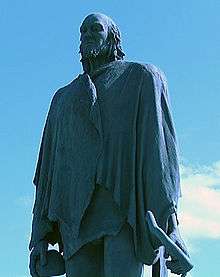Mechta-Afalou
Mechta-Afalou (Mechtoid) are an extinct population of North Africa. They inhabited the region during the late Paleolithic and Mesolithic, and are associated with the Iberomaurusian archaeological culture.
Mechtoids are believed to have been assimilated during the Neolithic and early Bronze Age by the makers of the ensuing Capsian culture.[1] Craniometric analysis indicates that these Iberomaurusians were closely related to the early Holocene Capsians of the Maghreb, as well as the early Holocene Kiffians of the Sahara.[2]
See also
Notes
- ↑ P. Sheppard & D. Lubell (1991). "Early Holocene Maghreb prehistory: an evolutionary approach" (PDF). Sahara. 3: 63–9. Retrieved 4 August 2016.
- ↑ Sereno PC, Garcea EAA, Jousse H, Stojanowski CM, Saliège J-F, Maga A, et al. (2008). "Lakeside Cemeteries in the Sahara: 5000 Years of Holocene Population and Environmental Change" (PDF). PLoS ONE. 3 (8). doi:10.1371/journal.pone.0002995. Retrieved 3 August 2016.
References
- Physical Anthropology of European Populations, Mouton, 1980.
External links
- Antropologia Fisica
- Etnia Guanche
- Migration of Mechta-Afalou people (a.k.a. Ouchtatiens), marked light green on the map
This article is issued from Wikipedia - version of the 8/4/2016. The text is available under the Creative Commons Attribution/Share Alike but additional terms may apply for the media files.
